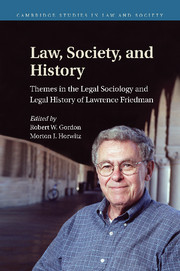Book contents
- Frontmatter
- Contents
- Contributors
- Introduction
- PART I OVERVIEWS AND ASSESSMENTS OF FRIEDMAN'S WORK
- 1 Lawrence Friedman and the Canons of Law and Society
- 2 “Then and Now”
- 3 Lawrence Friedman and the Bane of Functionalism
- 4 Lawrence M. Friedman's Comparative Law
- PART II APPLICATIONS OF CONCEPTS, INSIGHTS, AND METHODS IN FRIEDMAN'S WORK
- PART III THE LEGAL PROFESSION
- PART IV LAW AND LARGE AREAS OF SOCIAL LIFE
- PART V FACTS FROM THE UNDERGROUND: DIGGING LEGAL HISTORY OUT OF THE CELLAR
- PART VI PERSPECTIVES FROM OTHER CONCEPTUAL WORLDS
- Index
- Titles in the series
- References
1 - Lawrence Friedman and the Canons of Law and Society
Published online by Cambridge University Press: 07 October 2011
- Frontmatter
- Contents
- Contributors
- Introduction
- PART I OVERVIEWS AND ASSESSMENTS OF FRIEDMAN'S WORK
- 1 Lawrence Friedman and the Canons of Law and Society
- 2 “Then and Now”
- 3 Lawrence Friedman and the Bane of Functionalism
- 4 Lawrence M. Friedman's Comparative Law
- PART II APPLICATIONS OF CONCEPTS, INSIGHTS, AND METHODS IN FRIEDMAN'S WORK
- PART III THE LEGAL PROFESSION
- PART IV LAW AND LARGE AREAS OF SOCIAL LIFE
- PART V FACTS FROM THE UNDERGROUND: DIGGING LEGAL HISTORY OUT OF THE CELLAR
- PART VI PERSPECTIVES FROM OTHER CONCEPTUAL WORLDS
- Index
- Titles in the series
- References
Summary
In his witty and usually slightly irreverent way, Lawrence Friedman has provided a set of ideas that serve as the canons for much current work in law and society. Of course, part of the reason for that is that Lawrence himself has written so much of the work in the field. In addition to classic works like The Legal System: A Social Science Perspective, Total Justice, and A History of American Law, and his reader with Stewart Macaulay and Elizabeth Mertz, Law in Action: A Socio-Legal Reader, he has written on topics as diverse as slum housing, contract law, mandatory retirement, crime and punishment, family law, the war on terror, and inheritance. He has even written a movie review of Legally Blonde. The rest of us hardly have time to read all of Lawrence's work, much less to write much of our own.
In this brief reflection, I outline a few of the central themes in Friedman's work that have now reached more or less canonical status in the field of law and society. Given his fame and influence, such an exercise may be quite unnecessary, but my goal is to remind readers how very foundational his work is in the field of law and society.
The first and most basic theme that has reached canonical status is that law and the legal system are fundamentally social entities, born of social forces.
- Type
- Chapter
- Information
- Law, Society, and HistoryThemes in the Legal Sociology and Legal History of Lawrence M. Friedman, pp. 19 - 25Publisher: Cambridge University PressPrint publication year: 2011
References
- 2
- Cited by

